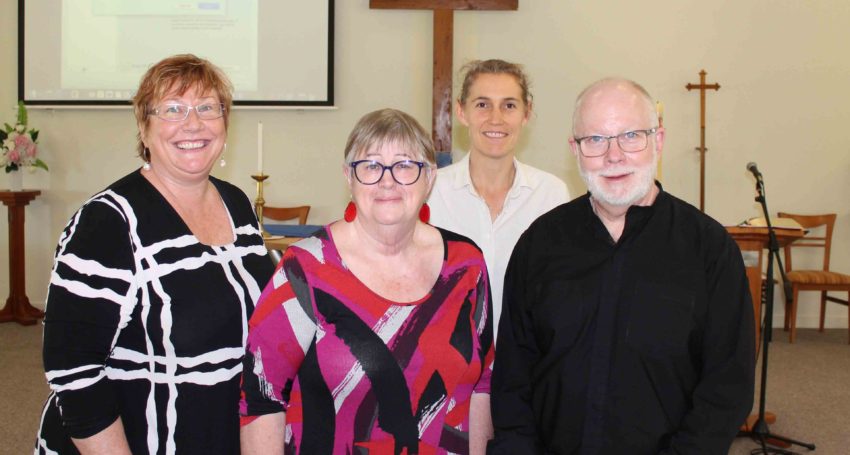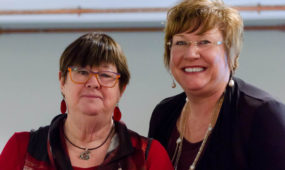Responding to the Holy Spirit in complex situations
Reflections
“The program and learning community enable us to identify, discuss, reframe and approach the emerging opportunities within our Cathedral community and to apply the skills we are learning in practical ways to areas that the Holy Spirit is moving us,” says Angie Mooney from Resource Church, St John’s Cathedral on the Adapting Ministry in Complex Times program and co-learning community

‘Adapting Ministry in Complex Times’ is an organic co-learning community within the Anglican Church Southern Queensland, hosted by St John’s Cathedral as part of the Resource Churches initiative. This exciting opportunity follows 11 years of proactive direction and collaboration initiated by Cathedral Dean, The Very Rev’d Dr Peter Catt.
Twelve parish-based communities throughout our Diocese have been invited to participate in a series of gatherings facilitated by The Rev’d Daniel Hobbs, as a Resource Church specialist, and Viv Read and Julie Cunningham, from consultancy organisation Complexability.
Advertisement
Two workshop gatherings have taken place since last month, with clergy and lay representatives from nominated parishes attending. The Cathedral team is represented by Dean Peter, Churchwarden Helen Wootton, Community Development Coordinator Judy Fay, server Harry McGuire and me.
The program seeks to form leaders so they can better discern and engage with what is emerging in their respective communities. Emerging opportunities may typically look like a ‘problem’ or ‘issue’ or ‘roadblock’. Re-framing these as emerging opportunities is the beginning of a new attitude in approaching such complexity, ultimately impacting decision making techniques and effectiveness.
In our first workshop, our fledgling group learnt though a group facilitation technique – a method that captures ideas that emerge from the group and provides a framework for decision making. The experiential learning was coupled with introductory theory about complex adaptive systems, based on the work of Welsh management consultant David Snowden who is the international pioneer in the application of complexity science.
Using a conceptual framework produced by David Snowden, the group came to understand the levels of complexity that our lives and communities are embedded in. The framework helps make sense of what we often see as ‘problems’ and assists in decision making by categorising our reality into ordered and unordered systems. It was illuminating to realise that even the simplest task in our community is embedded in a complex and unordered system. A lightbulb moment for me was the realisation that using simple decision making methods to approach complex situations is often unhelpful, if not useless or even harmful. Early detection, which captures what is emerging, is the key to early detection of potentially chaotic situations.
Advertisement
Understanding the human response to unordered systems was interesting and was demonstrated to be valuable to the Cathedral’s leadership team. When faced with a ‘problem’ often the first reaction is to take control and manage the situation. This reaction presses us to bring a given situation into order too quickly, which over simplifies the complexity and often proves ineffective.
The second half of the first workshop was also an extremely valuable experience. It embedded complex systems theory into a theological context. Interestingly, we discovered that David Snowden has a degree in theology and is active in the Catholic Church with a particular theological leaning towards liberation theology. He has managed to effectively capture in secular language a concept for the complexity of God working in our lives and communities.
Through group reflection we also came to witness the working of the Holy Spirit in our midst, throughout our church community and in our daily lives. Being attentive to what is emerging is key to being a witness to and honouring God. The group reflected on what arose for us during the day, what image of God we hold and how we see God relating to us in the world, with a take-home reflection of what implications this program and learning opportunity has for spirituality and prayer.
Related Story
 Reflections
Reflections
Navigating complexity together
Throughout the series of workshops, and associated activities, the group of us from the Cathedral are provided with an exciting opportunity to build shared capabilities between clergy and laity when working with complexity. The program and learning community enable us to identify, discuss, reframe and approach the emerging opportunities within our Cathedral community and to apply the skills we are learning in practical ways to areas that the Holy Spirit is moving us.
In these ever-changing times, this valuable program grounds a conceptual decision making model into a theological and practical model of discernment in a faith forming environment.





